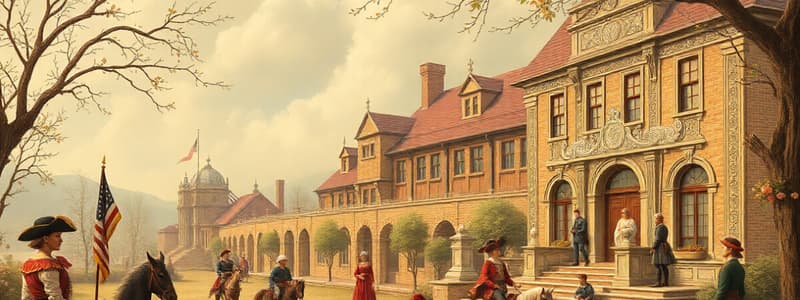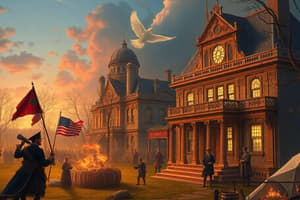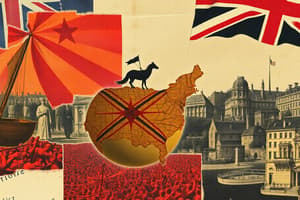Podcast
Questions and Answers
Which factor significantly hindered British efforts during the American Revolutionary War?
Which factor significantly hindered British efforts during the American Revolutionary War?
- The British army's superior knowledge of American geography.
- The overwhelming support for the British cause among American colonists.
- The incompetence of British generals in adapting to the conflict. (correct)
- The British army's effective use of guerilla warfare tactics.
What was the primary concern of the delegates at the First Continental Congress in 1774?
What was the primary concern of the delegates at the First Continental Congress in 1774?
- To negotiate a trade agreement with Great Britain.
- To establish a new monarchy in the colonies.
- To declare immediate independence from British rule.
- To address concerns about the future, given the situation in Boston. (correct)
Why did the Founding Fathers choose a republic over a direct democracy for the United States?
Why did the Founding Fathers choose a republic over a direct democracy for the United States?
- They felt that every citizen was equally qualified to govern directly.
- They believed direct democracy would ensure minority rights.
- They feared direct democracy would lead to mob rule and disregard for minority rights. (correct)
- They thought direct democracy would prevent the rise of dictators.
How does the system of checks and balances in the U.S. government function?
How does the system of checks and balances in the U.S. government function?
What action taken by the British government prompted the meeting of the First Continental Congress?
What action taken by the British government prompted the meeting of the First Continental Congress?
Which of the following advantages did the U.S. army possess during the Revolutionary War?
Which of the following advantages did the U.S. army possess during the Revolutionary War?
What was the significance of the Treaty of Paris in 1783?
What was the significance of the Treaty of Paris in 1783?
What concept reflects the idea that the power of the government comes from the people it governs?
What concept reflects the idea that the power of the government comes from the people it governs?
Which of the following factors contributed to the colonists' dissatisfaction with British rule despite enjoying a high living standard?
Which of the following factors contributed to the colonists' dissatisfaction with British rule despite enjoying a high living standard?
How did the British government's policies following the Seven Years' War (1756-1763) alter its relationship with the American colonies?
How did the British government's policies following the Seven Years' War (1756-1763) alter its relationship with the American colonies?
Why did the Stamp Act unify the American colonists against British rule?
Why did the Stamp Act unify the American colonists against British rule?
How did the colonists' understanding of political representation differ from the British perspective?
How did the colonists' understanding of political representation differ from the British perspective?
What was the significance of the Boston Tea Party (1773) in escalating tensions between the American colonies and Britain?
What was the significance of the Boston Tea Party (1773) in escalating tensions between the American colonies and Britain?
Which of the following best encapsulates the concept of 'salutary neglect' as practiced by the British government in relation to the American colonies?
Which of the following best encapsulates the concept of 'salutary neglect' as practiced by the British government in relation to the American colonies?
How did the structure of colonial assemblies, such as the Virginia House of Burgesses, contribute to the development of American political thought?
How did the structure of colonial assemblies, such as the Virginia House of Burgesses, contribute to the development of American political thought?
How did the colonists’ perception of virtual representation influence their resistance to British taxation policies?
How did the colonists’ perception of virtual representation influence their resistance to British taxation policies?
Flashcards
1st Continental Congress
1st Continental Congress
Meeting of delegates from 13 colonies in Philadelphia to address concerns about the situation in Boston.
2nd Continental Congress
2nd Continental Congress
Meeting where delegates debated joining MA in the fight for liberty and agreed representative government was worth fighting for.
Declaration of Independence
Declaration of Independence
Document written by Thomas Jefferson in 1776, declaring the 13 colonies independent from Britain, based on grievances of despotism.
Treaty of Paris (1783)
Treaty of Paris (1783)
Signup and view all the flashcards
Democracy
Democracy
Signup and view all the flashcards
Republic
Republic
Signup and view all the flashcards
Checks & Balances
Checks & Balances
Signup and view all the flashcards
Consent of the Governed
Consent of the Governed
Signup and view all the flashcards
Colonial America
Colonial America
Signup and view all the flashcards
British Rule in Colonies
British Rule in Colonies
Signup and view all the flashcards
Colonial Self-Rule
Colonial Self-Rule
Signup and view all the flashcards
Seven Years’ War
Seven Years’ War
Signup and view all the flashcards
Increased Colonial Taxes
Increased Colonial Taxes
Signup and view all the flashcards
Stamp Act
Stamp Act
Signup and view all the flashcards
Virtual Representation
Virtual Representation
Signup and view all the flashcards
Boston Tea Party
Boston Tea Party
Signup and view all the flashcards
Study Notes
Colonial America
- The colonies were very prosperous
- There was less class distinction
- There were more job and land opportunities in the colonies
- The colonies provided the highest living standard in the world
- There was more freedom of religion and speech in the colonies
- Britain ruled the 13 colonies along the Eastern seaboard of the US
- Britain installed African enslavement in certain areas
- Britain took a large percentage of colonial dollars, natural resources, and crops
- From 1585-1760 the colonies were allowed self-rule in most areas
- Colonial assemblies had elected representatives, for example, the VA House of Burgesses
- Each colony had a British governor
How the Trouble Started
- The Seven Years' War occurred from 1756-1763
- British and American colonists fought the French and Native Americans
- Britain won the war, but was in debt
- Britain unfairly blamed colonists for the war
- From 1764-1774 Britain increased Colonial American taxes on food, legal documents, and building items
- More controls were placed on colonists
- Those who broke tax/smuggling laws were tried by British officials, not fellow colonists
- British troops were increased in the colonies
Stamp Act: Unified American Colonists
- The Stamp Act taxed Americans on all official papers
- It hurt the colonial economy
- Colonists were against British political tradition
- The King and House of Lords were not supposed to levy taxes
- The House of Commons, as people's reps, was the taxing body
- The British insisted colonists, as British subjects, were already represented in Parliament
- Colonists disagreed because Parliament had no colonial reps
- They feared "virtual representation” would enslave colonists to Britain
- They demanded Parliament abolish the tax since direct representation was impossible
- Patrick Henry, VA Rep, argued that Britain had no right to tax Virginians; only their elected reps could do that
Boston Tea Party (1773)
- From 1765-1773 colonists boycotted taxed goods
- The colonists sent tea shipments back to Britain
- In December 1773, Boston's British held 3 tea ships in the harbor
- The British insisted colonists pay for the tea
- Sons of Liberty threw the tea overboard
- Britain punished Boston by blockading the city and placing it under military rule
- Other colonists were sympathetic and scared
13 United Colonies
- In 1774, the 1st Continental Congress saw delegates from 13 colonies meet in Philadelphia
- They were concerned for the future based on the Boston situation
- In 1775, the Revolutionary War began
- MA militia fought British
- In 1775, the 2nd Continental Congress convened
- Delegates debated whether or not to join MA
- They agreed that representative government and liberty were worth war
- Patrick Henry said, “Give me liberty or give me death"
Declaration of Independence 1776
- It was written by Thomas Jefferson
- 55 delegates from 13 colonies signed it
- The Declaration blamed the British Government for the King and Parliament's despotism
- The US declared the right to set up their own government
- The US was to be a republic
- 13 colonies became "free & independent States"
- Citizens were given rights to “life, liberty, and the pursuit of happiness”
- In 1776, the rights were granted to all white males
- Later, expanded to include all genders & races
US Victory
- Defeating the British was difficult as the British had the world's best army, while the US soldiers were untrained farmers
- The US advantages were Gen. George Washington, the US army fighting on home soil, guerilla tactics, incompetent British generals, and French aid
- In 1783, the Treaty of Paris was signed
- The British recognized US independence
Founders Against Democracy
- The US is a republic.
- Founders were against democracy because it is "rule by all"
- The majority of the population votes directly
- This presented the danger of mob rule and the neglect of minority rights
- Not everyone is qualified to govern as some are selfish and others lack knowledge, experience, and maturity
- Large groups are prone to crowd dynamics
- A historical example is the French Revolution where Monarchy became Republic and then Mob Rule/democracy/murder of nobility before finally being a monarchy again with Napoleon
US Constitution 1789
- The US has a Two-House Congress
- Voters elect members to the House of Representatives; the # of reps is based on the population of districts within states
- Each state has 2 senators in the Senate
- For the Executive branch, at first an Electoral college chose the president, after the vote of each state's population, the candidate with the most state's wins
- In the Judicial branch, there is a Hierarchy of courts within the nation, with Supremem Court justices being chosen by the president
- Bill of Rights
- Some were afraid important rights might be left out of the Constitution
- The original bill had 10 amendments
- The 1st Amendment guarantees freedom of speech, press, religion, and assembly
- Today, there are a total of 27 Amendments
US a Republic
- The US government is built "by consent of the governed"
- People elect representatives to govern on their behalf
- Checks & balances that keep a government branch from becoming too powerful
- The President has a veto, Congress can override it and the Supreme Ct. judges laws as constitutional or unconstitutional
- The Senate & House have to agree for most decisions
- The Electoral vote is a check on the popular vote
- State power is a check on popular power
- There are Term limits on the President and Congress
- There is Freedom of religion, a New concept
- Citizens have freedom to worship or not
- There is Separation of church & state, government keeps out of religious affairs
- Any American religion could serve in government
Studying That Suits You
Use AI to generate personalized quizzes and flashcards to suit your learning preferences.




